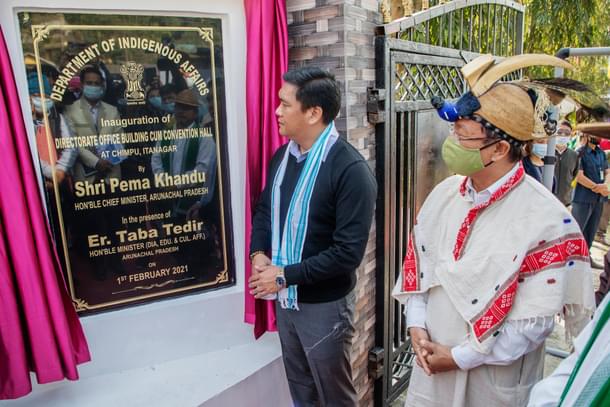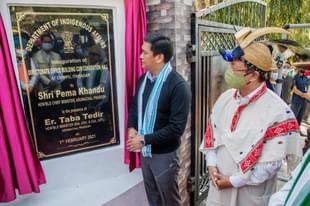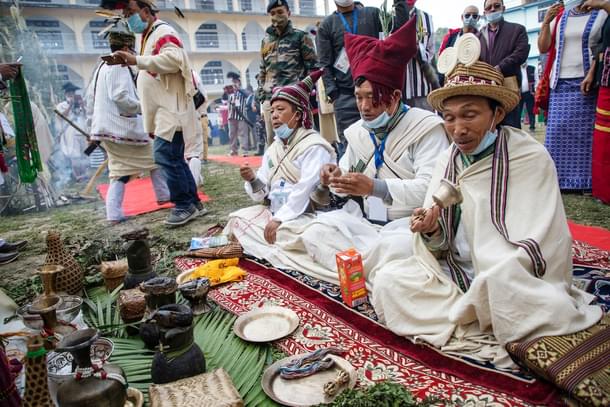Politics
How Arunachal Pradesh Is Safeguarding Its Indigenous Cultures From Christian Missionaries And Conversion
Jaideep Mazumdar
Feb 05, 2021, 09:30 AM | Updated 09:30 AM IST
Save & read from anywhere!
Bookmark stories for easy access on any device or the Swarajya app.


One of the first acts of the incumbent BJP government in Arunachal Pradesh was to create a Department of Indigenous Faiths and Cultural Affairs in September 2017.
The mandate of this department was to preserve indigenous faiths like Donyi-Polo, Amik-Matai, Nani-Intaya, Rangfrah and others.
The department was also tasked with constructing prayer halls and other infrastructure for the practice and promotion of indigenous faiths, promoting local languages and scripts to codify practices and rituals of indigenous faiths and to conduct programmes and certificate courses for priests of these faiths.
The unstated but underlying objective of these measures was to resist the onslaught of evangelisation by Christian missionaries in the state.
Christians are the largest religious group in the state and constitute about 35 per cent of the state’s total population of 17.12 lakh.
Statistics prove the belligerent evangelism of the church: Christians formed a mere 0.79 per cent of the state’s population in 1971, increased to 4.32 per cent in 1981, 10.3 per cent in 1991, 18.72 per centin 2001 and 30.26 per cent in 2011.
Though Arunachal Pradesh has anti-conversion laws and the entry of Christian missionaries is banned in the state, mass scale conversions have taken place through inducements and other illegal means.
The Arunachal Pradesh freedom of Religion Act, 1978, expressly prohibits conversion of tribals to other non-indigenous faiths, but this law has never been enforced.
Christian missionaries operating from their bases in Assam close to the inter-state border with Arunachal Pradesh have successfully managed to lure tribals with offers of free education, healthcare and doles, and convert them.
The Congress, which has governed Arunachal for most of the years since the state was formed in 1987, had turned a blind eye to the activities of Christian missionaries operating from just beyond its borders.
Succssive Congress governments at the Centre, which had administered the North-East Frontier Agency (NEFA)--the state’s forerunner--directly had also done nothing to stop mass conversions of the tribals.
In fact, says Arunachal Pradesh BJP state chief and Lok Sabha MP Tapir Gao, the Congress encouraged the conversions. “The Congress had tacitly encouraged conversions of innocent tribals. But it is good that more and more converts are now returning to their tribal fold,” said Gao.
BJP state leaders say that evangelism of the Christian missionaries, especially the Roman Catholic church, received a boost during Rajiv Gandhi’s tenure as Prime Minister from the mid to late 1980s and also during the UPA I and II regimes when Sonia Gandhi was the real power centre.
The pushback against largescale conversions started in the late 1970s in a small way with the formalisation of the Donyi Polo faith by Talom Rukbo.
Donyi Polo as a faith was codified by Rukbo, whose birth anniversary on December 1 is celebrated in Arunachal Pradesh as ‘indigenous faith day’.
Various tribal animistic, shamanic and other rituals were brought together and codified, and practices associated with many tribal forms of worship were formalised.
But the Congress governments in the state and the Centre did nothing to promote the indigenous faith and even initiated measures to dissuade tribals from practising their traditional faiths.
The Christian missionaries, with huge funds, mostly from overseas, at their disposal found it very easy to lure the economically and socially backward tribals.
Also, the indigenous faiths used to place a premium on animal sacrifice and other expensive rituals, and all that imposed a lot of hardships on the poor tribals.
“Christian missionaries opened schools, colleges, clinics and hospitals in many areas in Assam bordering Arunachal, offered free boarding and scholarships to tribal youth and free healthcare to the tribals. They also offered doles like foodstuff and other material and even financial help to tribals to convert. Hence, many fell for that and converted,” said BJP state chief Gao.
Things started changing only over the last four years since the BJP formed the government in the state. The setting up of the Department of Indigenous Faiths & Cultural Affairs was a concrete step in encouraging the practice and propagation of the animism and nature worship that are indigenous to Arunachal Pradesh.
“Indigenous culture and faiths are the identity and pride of our state. Our culture, of which our indigenous faiths are an integral part, are like our roots. If our roots are not strong, we will not grow into a strong and healthy society,” said Arunachal chief minister Pema Khandu.
Earlier this week, Khandu inaugurated a 15-day workshop on ‘priesthood of indigenous faiths’ organised by the new department.

The workshop, the first of a series planned by the department, is aimed at providing a platform to priests of indigenous faiths to exchange knowledge and views, and receive feedback from them on steps that can be taken by the government to promote the indigenous faiths.
Indigenous & cultural affairs minister Taba Tedir said that the department had decided to focus on priests since they are the repository of a lot of knowledge of indigenous beliefs and practices.
“We will collect, collate and codify all such beliefs and practices. The department will also conduct certificate courses on priesthood and offer scholarships and incentives to any tribal youth wanting to become priests,” he said.
Inaugurating the workshop earlier this week, Chief Minister Khandu had said that priests, being the “custodians of ancestral knowledge and wisdom”, will “play a very important role preserving and propagating the wisdom of our ancestors to future generations”.
Khandu said the state government is also offering a lot of assistance to researchers and academics to develop scripts for native dialects of the state.
“Without a written script, almost all our native languages are only spoken and passed on orally. With modern education and exposure, the younger generation is moving away from their native languages and it has become a major concern for us,” he said.
“Our languages are the connections to our culture. If language is lost, our cultural heritage will be lost,” he cautioned.
Indigenous Affairs Minister Tedir said that the department is also working on publishing literature on indigenous folklores and traditions, sponsoring traditional medicinal plants and healing systems, promoting indigenous games and managing welfare schemes for priests.
“This active promotion and state patronage of indigenous faiths like Donyi-Polo will stave off the onslaught of the Christian missionaries and result in bringing back converts to the tribal fold. These steps will instill pride among our youth for our ancient faiths and practices, and will thus prevent them from falling to the material allurements of missionaries,” said Tajom Tasung, president of the Indigenous Faith & Cultural Society Of Arunachal Pradesh (IFCSAP) (see the Society’s facebook page).
IFCSAP general secretary Bai Taba says that conversions to Christianity have also triggered social tensions. “They (the converts and Chrristian priests) scorn us and our beliefs, and they have disowned their roots. This has caused enmity between tribals,” he said.
Taba said the government’s recent moves to preserve, propagate and popularise tribal faiths, beliefs and traditions will address this grave issue.
Those leading the revival of the traditional faiths have, with active encouragement from the present government, been carrying out far-reaching reforms.
Khomseng Khomrang, a religious leader of Rangfraa faith (that practices animism), said practices like animal sacrifices and obscurantist practices are being junked and tribal youth are being encouraged to propagate the indigenous faiths.
Khomrang is also in the forefront of a movement to integrate the indigenous faiths like Donyi-Polo, Amik-Matai, Nani-Intaya and Rangfraa.
“There is a lot in common among all these indigenous faiths and all are based on animism and nature worship. The differences exist only in some rituals,” said Khomrang.
This movement to integrate the indigenous faiths is being backed by the new department of indigenous faiths. “Once all the indigenous faiths get integrated, it will form a solid bulwark against Christian missionaries and will also reverse the trend of conversions to Christianity,” said IFCSAP president Tajom Tasung.
The efforts of the new department have started showing results on the ground. IFCSAP says that the rate of conversions to Christianity has gone down appreciably while the number of those returning to the tribal fold has also gone up.
The congregations at the new prayer halls of indigenous faiths that have been constructed by the department are growing significantly. And there is ample evidence of young men and women evincing interest in their indigenous faith and cultures, and taking pride in them.
A lot of research into indigenous faiths, medicines and cultural practices is happening and these will result in the publication of a lot of literature. That will go a long way in promoting indigenous belief systems and faiths.
At the same time, increased scrutiny on inflow of funds from abroad by the Union Government has forced Christian missionaries to cut back on their evangelism. Backlash from tribals have also dampened their enthusiasm to lure tribals into their Abrahamic fold.
All that is, of course, good news for Arunachal Pradesh.
Jaideep Mazumdar is an associate editor at Swarajya.





